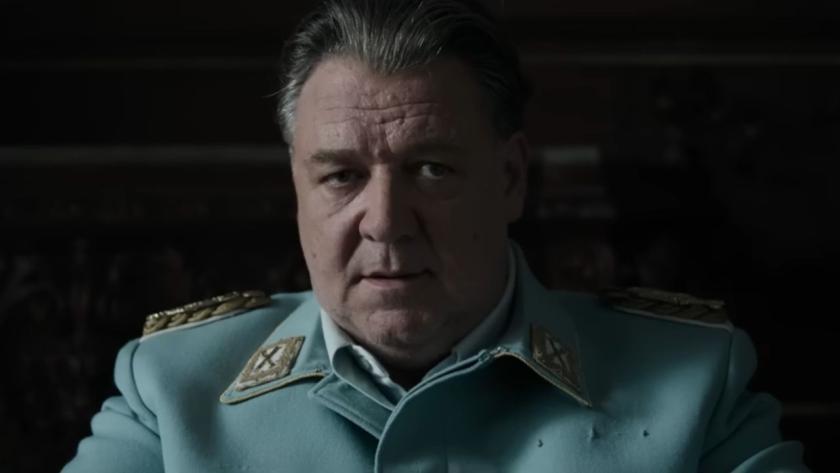It's hard to criticise a movie that opens with a shot of an Allied G.I. spitting and urinating on a Nazi insignia, but that moment of smug satisfaction (Nazi punks must die!) is fleeting. Nuremberg, written and directed by James Vanderbilt, has more on its mind than self-congratulation.
Drawing on Jack El-Hai's book "The Nazi and the Psychiatrist" and other biographies and autobiographies, Nuremberg focuses on the complex prosecution of Hitler's second in command, Herman Goering, and 21 other top Nazi officials.
Where its esteemed predecessor, Judgment at Nuremberg (1961), found drama in the trial of Third Reich judges who enforced anti-Semitic laws, the new film goes straight to the top – or the top of the list of war criminals who hadn't managed to kill themselves before capture.
Goering (Russell Crowe) actually turned himself in, relishing the chance to rehash his and his regime's rise to power. Squaring off against him is an American army psychiatrist, Major Douglas Kelley, who hoped to discover whether the Germans of the 1930s were different from everyone else – to make sure that the Holocaust never happens again, Kelley proclaims. And to write a bestselling book (22 Cells in Nuremberg. A Psychiatrist Examines the Nazi Criminals).
"Everybody wants to be listened to," says Kelley, who believes that Goering and others will implicate themselves on the stand. Though Kelley (a wiry, alert Rami Malek) thinks he's established a rapport with Goering, he's in over his head. The Reichsmarschall, portrayed with slimy bonhomie by Russell Crowe, toys with the Americans like a tomcat batting at its prey.
First he fools his captors into believing that he cannot speak English, then he charms them with self-effacing jokes about his rotund belly. Fun fact about Goering: throughout World War Two, he was pounding 40 or more codeine tablets a day.
"I think it's safe to say that the Marshall's got a drug problem," says one jailer, who prescribes cold-turkey detox – and a strict diet – to get Goering fit for trial. Crowe, endearingly, did not slim down: he's well into the gruff, burly character actor phase of his career, and in Nuremberg gives one of his most beguiling performances.
Malek has a subtler task, mostly being required to listen intently and suggesting, through small gestures, Major Kelley's growing doubt and instability. When Goering tells Kelley that he's not important, that he will lead an unhappy life, Malek flinches, just barely, enough to tell us that this is exactly what Kelley fears and expects.
The Nuremberg prosecutors face more arduous preparation. Though armed with an array of evidence, they must argue that the charges (conspiracy, war crimes, crimes against humanity) and the international tribunal itself are legitimate.
Despite widespread sentiment that the victors should just shoot the Nazis and be done with it, the court's chief jurist, Robert H. Jackson (Michael Shannon), wants to expose them in court, to reveal the process by which Jews were made scapegoats, then stateless, then marked for death.
"All this started with laws," Jackson says. "And it ends in a courtroom." Despite that high-minded goal, the judge demands that Kelley help the prosecution by turning over his session notes. Neither one of them suspects just how badly Goering wants to testify: He's like a virus looking for a host, and the trial, filmed for posterity and shown in movie theaters, offers him the chance to infect the world.
So Goering downplays his anti-Semitism, painting himself as a patriot who did his job and barely knew what was happening around him. His "What about...?" tactics, arguing that the Allies were just as bad, will sound horribly familiar. He also says he had a hard childhood: His parents seem to have been in a ménage-a-trois with Goering's wealthy Jewish godfather.
It's when the prosecution shows film footage of the death camps, though, that Goering shows who he really is. Look closely and you'll see that the accused has donned a pair of sunglasses, either to hide from the horror or to conceal the twinkle in his eye. (The footage, now as then, is worse than anyone could have imagined.)
Though earlier films about the trials – particularly Judgment at Nuremberg and a very good 1990s TV miniseries starring Brian Cox as Goering – played to audiences who actually lived through the war, this one arrives when people are starting to forget.
That amnesia, sad as it is, is what allows writer-director Vanderbilt to compress time and combine characters. As with David Fincher's Zodiac (2007), a key character is all but removed from the story midway through, while seemingly minor players (Leo Woodall as a military translator and Richard E. Grant as a British jurist) become prominent.
This is seriously unflashy filmmaking with a few awkward transitions, including a coda that seems awfully sudden. Still, it hits hard. As Woodall's character says, late in the film, "Want to know why it happened here? People let it happen. People didn't stand up until it was too late." Nuremberg is a sober reminder that the past is not that long ago. And that today is later than we think.















Add comment